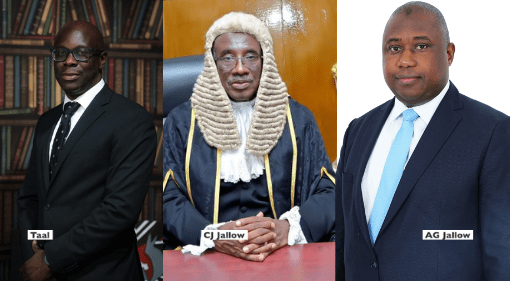
By Alagie Manneh
The President of the Gambia Bar Association, Salieu Taal, has spoken on the much-talked about judicial officers remuneration bill, arguing that it will safeguard the independence and integrity of judicial officers.
Last Monday, government tabled the bill seeking to provide wide-ranging changes to the condition of service for judicial officers including lucrative allowances and pensions, vehicles, accommodations and even payments to spouses of judges who died in office.
The bill, which is set for a second reading today, generated public debate and anger with many observers saying that ”following the executive and legislature, it is now the turn of the judiciary to rip Gambians off their hard earned tax money”.
However, in his reaction as a private citizen, Mr Taal said what is important is for the public to have an understanding of the context and background of ensuring judicial officers are remunerated “because of the uniqueness of their role as the independent arbiters of the law”.
“In my opinion, this is really about helping to safeguard the independence and integrity of the offices they hold and the delicate high stake issues they adjudicate on daily basis,” he told The Standard yesterday.
He added that without a better pay structure, it will be difficult to attract and retain high quality legal practitioners to work for government and as a country that is emerging from a dictatorship, the judiciary is one of the key institutions of the state alongside other state organs that needs its independence safeguarded and protected. “So I support the improvement and enhancement of the remunerations,” he said.
Mr Taal noted that he is very much aware of the outrage that greeted the bill, but he said people must not lose sight of the fact that its details can be studied within the context of our economic realities.
“I trust our NAMs will do so diligently, drawing from comparative experiences in sister jurisdictions. Having said that, I will add that the general pay structure of the entire public service particularly, the lower cadre, should be reviewed and improved,” Mr Taal observed.
Asked about some commentators claim that the proposed bill is a “public thievery”, Mr Taal said that is not a fair observation.
“I do not think it is fair to categorise the proposal as public thievery. The judiciary does not have the power to make law or policy. They have made a proposal which has gone to cabinet and now before the National Assembly. People are entitled to disagree with the bill in its entirety or partly based on their understanding. I believe with more extensive discussions and communications about the reasoning for the bill, we would have a more informed debate. The ultimate power to accept, reject or amend the bill is in the hands of our elected national representatives. My advice is for the bill to be sent to the appropriate committee for proper scrutiny,” he concluded.



